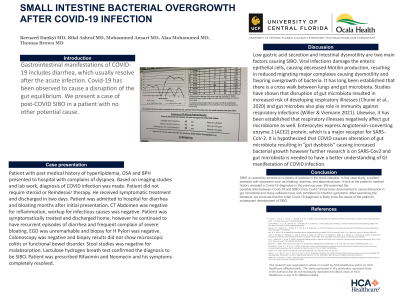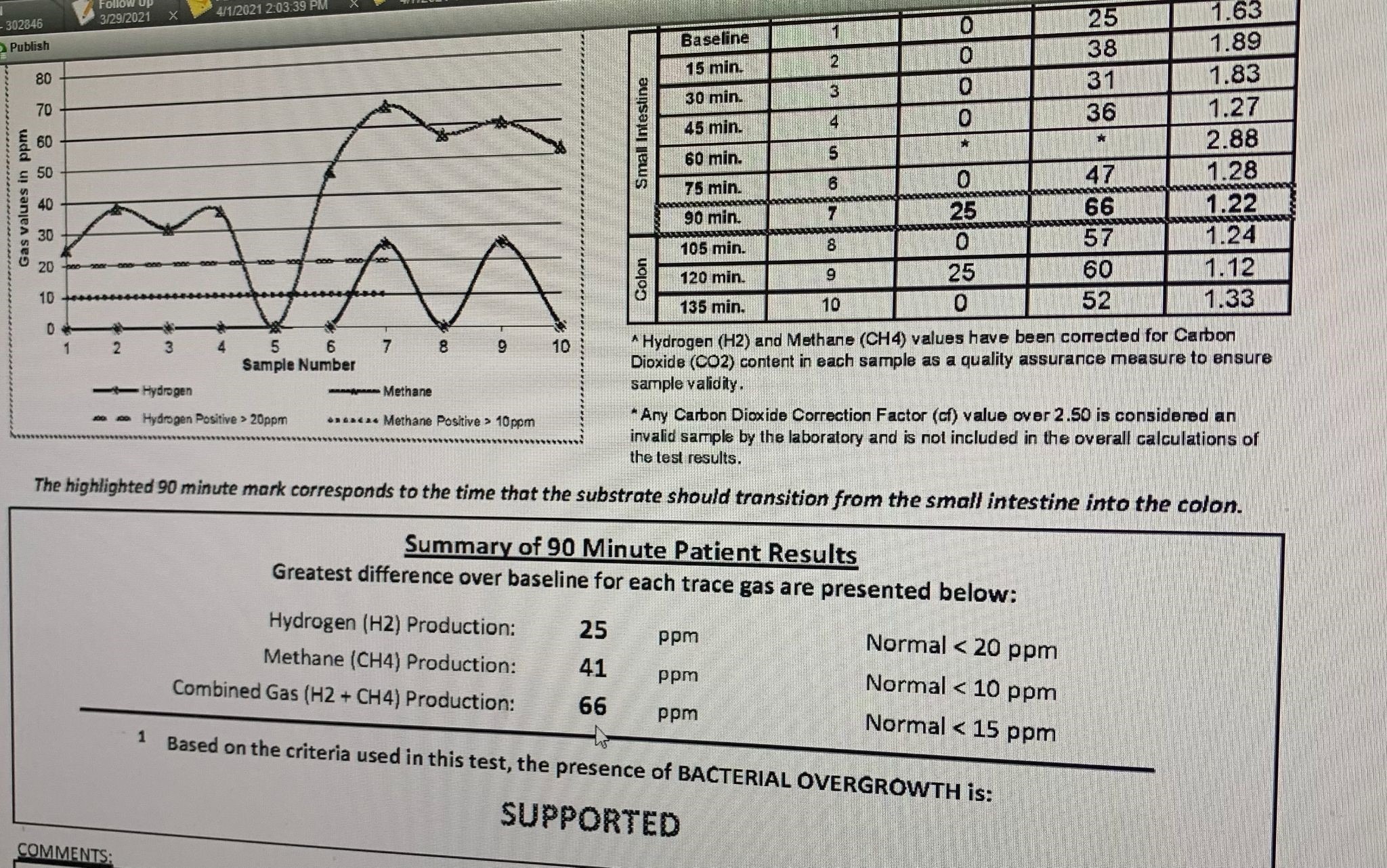Back


Poster Session C - Monday Afternoon
Category: Small Intestine
C0652 - Small Intestine Bacterial Overgrowth After COVID-19 Infection
Monday, October 24, 2022
3:00 PM – 5:00 PM ET
Location: Crown Ballroom

Has Audio

Bernard Dankyi, MD
UCF College of Medicine-HCA GME Consortium/HCA Florida Ocala Hospital
Ocala, FL
Presenting Author(s)
Bilal Ashraf, MD1, Mohammed Ansari, MD1, Alaa Mohamed, MD1, Bernard Dankyi, MD2
1HCA/UCF Ocala Regional Medical Center, Ocala, FL; 2UCF College of Medicine-HCA GME Consortium/HCA Florida Ocala Hospital, Ocala, FL
Introduction: Gastrointestinal manifestations of COVID-19 includes diarrhea, which usually resolve after the acute infection. Covid-19 has been observed to cause a disruption of the gut equilibrium. We present a case of post-COVID SIBO in a patient with no other potential cause.
Case Description/Methods: Patient with past medical history of hyperlipidemia, OSA and BPH presented to hospital with complains of dyspnea. Based on imaging studies and lab work, diagnosis of COVID infection was made. Patient did not require steroid or Remdesivir therapy. He received symptomatic treatment and discharged in two days. Patient was admitted to hospital for diarrhea and bloating months after initial presentation. CT Abdomen was negative for inflammation, workup for infectious causes was negative. Patient was symptomatically treated and discharged home, however he continued to have recurrent episodes of diarrhea and frequent complain of severe bloating. EGD was unremarkable and biopsy for H Pylori was negative. Colonoscopy was negative and biopsy results did not show microscopic colitis or functional bowel disorder. Stool studies was negative for malabsorption. Lactulose hydrogen breath test confirmed the diagnosis to be SIBO. Patient was prescribed Rifaximin and Neomycin and his symptoms completely resolved.
Discussion: Low gastric acid secretion and intestinal dysmotility are two main factors causing SIBO. Viral infections damage the enteric epithelial cells, causing decreased Motilin production, resulting in reduced migrating major complexes causing dysmotility and favoring overgrowth of bacteria. It has long been established that there is a cross walk between lungs and gut microbiota. Studies have shown that disruption of gut microbiota resulted in increased risk of developing respiratory illnesses (Chunxi et al., 2020) and gut microbes also play role in immunity against respiratory infections (Willer & Viemann 2021). Likewise, it has been established that respiratory illnesses negatively affect gut microbiome as well. Enterocytes express Angiotensin-converting enzyme 2 (ACE2) protein, which is a major receptor for SARS-CoV-2. It is hypothesized that COVID causes alteration of gut microbiota resulting in “gut dysbiosis” causing increased bacterial growth however further research is on SARS-Cov2 and gut microbiota is needed to have a better understanding of GI manifestation of COVID infection.

Disclosures:
Bilal Ashraf, MD1, Mohammed Ansari, MD1, Alaa Mohamed, MD1, Bernard Dankyi, MD2. C0652 - Small Intestine Bacterial Overgrowth After COVID-19 Infection, ACG 2022 Annual Scientific Meeting Abstracts. Charlotte, NC: American College of Gastroenterology.
1HCA/UCF Ocala Regional Medical Center, Ocala, FL; 2UCF College of Medicine-HCA GME Consortium/HCA Florida Ocala Hospital, Ocala, FL
Introduction: Gastrointestinal manifestations of COVID-19 includes diarrhea, which usually resolve after the acute infection. Covid-19 has been observed to cause a disruption of the gut equilibrium. We present a case of post-COVID SIBO in a patient with no other potential cause.
Case Description/Methods: Patient with past medical history of hyperlipidemia, OSA and BPH presented to hospital with complains of dyspnea. Based on imaging studies and lab work, diagnosis of COVID infection was made. Patient did not require steroid or Remdesivir therapy. He received symptomatic treatment and discharged in two days. Patient was admitted to hospital for diarrhea and bloating months after initial presentation. CT Abdomen was negative for inflammation, workup for infectious causes was negative. Patient was symptomatically treated and discharged home, however he continued to have recurrent episodes of diarrhea and frequent complain of severe bloating. EGD was unremarkable and biopsy for H Pylori was negative. Colonoscopy was negative and biopsy results did not show microscopic colitis or functional bowel disorder. Stool studies was negative for malabsorption. Lactulose hydrogen breath test confirmed the diagnosis to be SIBO. Patient was prescribed Rifaximin and Neomycin and his symptoms completely resolved.
Discussion: Low gastric acid secretion and intestinal dysmotility are two main factors causing SIBO. Viral infections damage the enteric epithelial cells, causing decreased Motilin production, resulting in reduced migrating major complexes causing dysmotility and favoring overgrowth of bacteria. It has long been established that there is a cross walk between lungs and gut microbiota. Studies have shown that disruption of gut microbiota resulted in increased risk of developing respiratory illnesses (Chunxi et al., 2020) and gut microbes also play role in immunity against respiratory infections (Willer & Viemann 2021). Likewise, it has been established that respiratory illnesses negatively affect gut microbiome as well. Enterocytes express Angiotensin-converting enzyme 2 (ACE2) protein, which is a major receptor for SARS-CoV-2. It is hypothesized that COVID causes alteration of gut microbiota resulting in “gut dysbiosis” causing increased bacterial growth however further research is on SARS-Cov2 and gut microbiota is needed to have a better understanding of GI manifestation of COVID infection.

Figure: Lactulose hydrogen breath test results
Disclosures:
Bilal Ashraf indicated no relevant financial relationships.
Mohammed Ansari indicated no relevant financial relationships.
Alaa Mohamed indicated no relevant financial relationships.
Bernard Dankyi indicated no relevant financial relationships.
Bilal Ashraf, MD1, Mohammed Ansari, MD1, Alaa Mohamed, MD1, Bernard Dankyi, MD2. C0652 - Small Intestine Bacterial Overgrowth After COVID-19 Infection, ACG 2022 Annual Scientific Meeting Abstracts. Charlotte, NC: American College of Gastroenterology.
